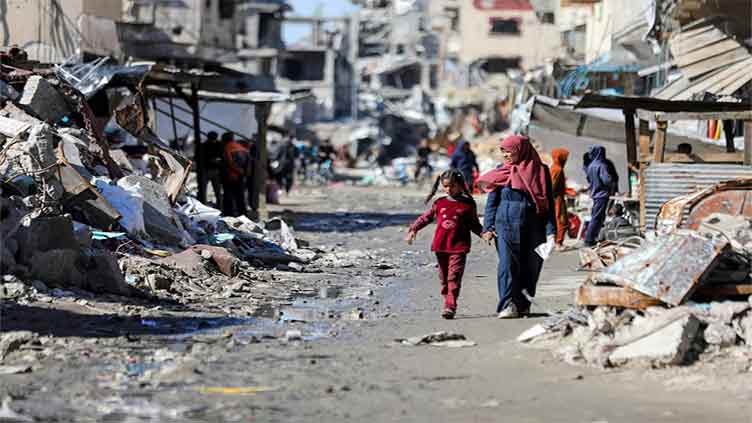US strains with Israel show as Blinken tours Middle East

World
US strains with Israel show as Blinken tours Middle East
CAIRO/JEDDAH (Reuters) - US Secretary of State Antony Blinken arrived in Saudi Arabia on Wednesday, launching a tour of the Middle East to try to secure a ceasefire in the Gaza war as increasing strain showed in Washington's relationship with its ally Israel.
In Gaza, where hopes were dashed for a ceasefire in the nearly six-month-old war in time for Ramadan last week, residents of Gaza City in the north described the most intense fighting for months around the Al Shifa hospital.
Israel claimed to have killed 90 gunmen in a battle under way there for a third day; Hamas denied fighters were present and said those killed in the hospital were civilians.
Following his visit to Saudi Arabia on Wednesday, where he was expected to meet ruling Crown Prince Mohammed bin Salman, Blinken is due in Egypt on Thursday and Israel on Friday.
The State Department announced Blinken's planned stop in Israel only after he had arrived in Saudi Arabia. No explanation was immediately given for why it was omitted from the initial itinerary.
Recent days have seen an intensification of fighting in northern parts of Gaza captured by Israeli forces early in the war, including Al Shifa, once Gaza's biggest hospital, now one of the few even partially functioning in the north.
"We are living through similar dreadful conditions to when Israeli forces first raided Gaza City: sounds of explosions, Israeli bombardment of houses is non-stop," Amal, 27, living around a kilometre from Al Shifa hospital, told Reuters via a chat app.
On Tuesday Israeli Prime Minister Benjamin Netanyahu rebuffed a plea from US President Joe Biden to call off plans for a ground assault of Rafah, the city on the southern edge of Gaza sheltering more than half the enclave's 2.3 million people.
Netanyahu told lawmakers he had made it "supremely clear" to Biden in a phone call "that we are determined to complete the elimination of these battalions in Rafah, and there's no way to do that except by going in on the ground".
Israel says Rafah is the last major holdout of armed fighters from Hamas. Washington says a ground assault there would be a "mistake" and cause too much harm to civilians.
State Department spokesman Matthew Miller said one of Blinken's aims was to discuss with Israeli leaders how to defeat Hamas "including in Rafah, in a way that protects the civilian population, does not hinder the delivery of humanitarian assistance and advances Israel’s overall security."
TENSION
The public tension between the Biden and Netanyahu administrations has little precedent in Israel's history as a close ally of Washington since its founding in 1948.
Last week, Chuck Schumer, leader of Biden's Democratic Party in the Senate and the highest-ranking Jewish US elected official, called for Israeli voters to replace Netanyahu. Biden called it a "good speech"; Netanyahu called it "inappropriate".
Netanyahu is increasingly aligning with Biden's domestic political opponents in a U.S. presidential election year. A source familiar with the plan said Netanyahu would address US Republican senators in a video linkup to their weekly policy lunch on Wednesday.
Long-running Gaza ceasefire talks have resumed this week in Qatar after Israel rejected a counter-proposal from Hamas last week. Both sides have discussed a truce of around six weeks during which Hamas would release around 40 Israeli hostages in return for hundreds of Palestinian detainees.
But despite months of talks mediated by the United States, Egypt and Qatar, they still differ on what would follow any truce. Hamas says it will release hostages only as part of an agreement that would end the war; Israel says it will discuss only a temporary pause.


